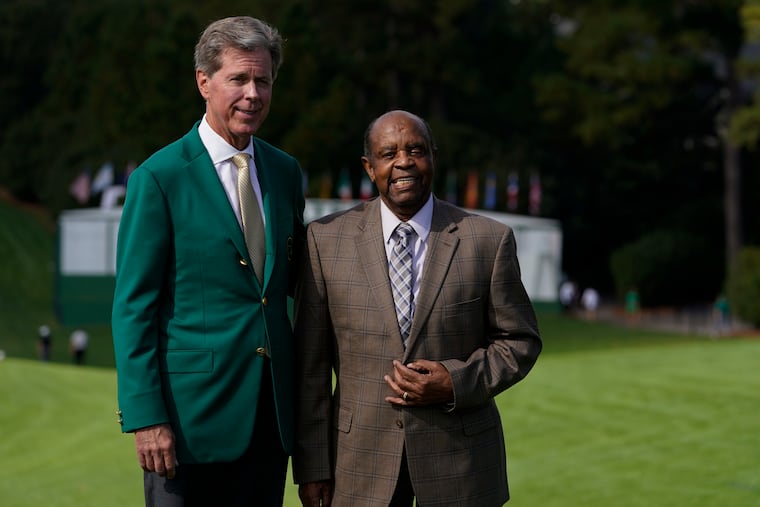Masters chair Fred Ridley avoids LIV ethical issues as he assuages his banned PGA Tour ‘friends’
"Anything I might say is not a comment, a personal comment, against their character,” as he gives us a window into his own.

AUGUSTA, Ga. — To no one’s surprise, the most iconic golf club on the planet isn’t interested in humanistic moral arguments. After all, Augusta National didn’t admit Blacks until 1990 and banned women until 2012, almost a decade after women’s rights hero Martha Burk unsheathed her bayonet.
The membership and its leadership have slowly evolved, but, true to its general form, Augusta National and Masters chairman Fred Ridley on Wednesday declined to address the moral compromise involved with inviting and legitimizing LIV Golf and its backer, the oppressive Saudi regime that has been connected with the 9/11 attacks in 2001. Instead, he sent the message to LIV players that his disapproval of their alignment with the existential threat to the PGA Tour was nothing personal.
» READ MORE: LIV loses in court: ‘That certainly changes the dynamic of everything,’ says Rory McIlroy
“I know many of these players who are no longer on the PGA Tour. Some of them I would consider friends,” Ridley said. “So anything I might say is not a comment, a personal comment, against their character.”
In saying that, he gave us a window into his own.
Ridley spoke at his annual pre-tournament press conference, and he was intent on minimizing Augusta National’s role helping a nation so oppressive of human rights that that it often imprisons human rights advocates. Of course, Augusta National is part of a DOJ antitrust investigation, so banning LIV golfers at this moment might be imprudent. Still, sports-washing of its image seems a misuse of the Masters’ massive power.
“I certainly have a general understanding of the term,” Ridley said at his annual pre-tournament address. “I think, you know, it’s for others to decide exactly what that means. These were personal decisions of these players, which I, you know, at a high level, don’t necessarily agree with.”
The Masters’ refusal to take a stand is unfortunate for people like Terry Strada, the widow of Tom Strada, a financial planner killed in the World Trade Center attacks. Terry Strada leads 9/11 Families United, which is outraged at the normalization of LIV and its backers, a nation whose agents appear to have knowingly helped fund the 9/11 terrorist attacks. She met with reporters Tuesday in Atlanta. She’d recently sent a letter to Ridley requesting an audience with him, which culminated in what she called a “brief” phone conversation Monday.
“He wanted me to understand his side as a person making those decisions,” Strada said. “I didn’t agree with him.”
Ridley indicated Wednesday that his “high level” of disagreement lay in their eagerness to bite the hand that fed them: “It really wasn’t intended to go beyond that.”
That’s why superstar LIV defectors Phil Mickelson, Sergio Garcia, and Dustin Johnson will tee it up Thursday with loyalists Tiger Woods, Rory McIlroy, Jordan Spieth.
» READ MORE: Can Tiger Woods contend at the Masters? No. Can he make the cut again? Depends.
Ridley’s disagreement did not involve the players acting as international sports-washers. His disagreement was limited to the players abandoning the PGA Tour, where they built their games and legacies, only to defect to a rival tour, some for hundreds of millions of dollars.
He stayed consistent to his statement in December, when he announced that any LIV players who qualified could come.
“Regrettably, recent actions have divided men’s professional golf by diminishing the virtues of the game and the meaningful legacies of those who built it. Although we are disappointed in these developments, our focus is to honor the tradition of bringing together a preeminent field of golfers this coming April.”
That remained the tenor of Ridley’s response Wednesday.
» READ MORE: LIV defectors get love, handshakes, and hugs at the Masters as they seek major validation
“My comment in December was really more that I was expressing some disappointment that these players were taking the platform that had been given to them ... and moving to another opportunity,” he said, “perhaps not thinking about who might come behind them.”
Notably, Ridley offered no public sympathy to the widows, to the widowers, or to the children left parentless by the attacks. He did, however make sure that his LIV pals knew he still wanted to be friends.